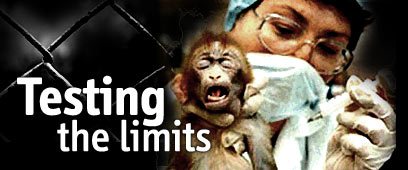

Researchers inject animals with cancer cells. Weizmann Institute
Photo: Gili Sofer
TEL AVIV - One animal experiment still being conducted in Israel, although alternative methods have been developed, is the Lethal Dose 50 Acute Toxicity Test, or LD50.
This experiment tests the toxic level of substances by exposing lab animals to gradually increasing dosages of these substances. When a certain dose kills 50 percent of the subject group (usually rats or mice), that dose is then considered to be the lethal dose.
In 2001, the Organization for Economic Cooperation and Development's Chemical Committee, which is responsible for national chemical policies and safety procedures of member countries, agreed to omit the experiment from its manual of internationally accepted test guidelines.
The organization accepted three alternative methods as sufficient replacements, and although these alternative methods still require the use of animals, the number of animals used is greatly reduced. One alternative test does not require any animal deaths.
The alternative, known as the Fixed Dose Procedure, was developed in Great Britain and is based on toxicologists noticing signs that hint at the lethal dose, instead of having to continue injecting the substances until the animals die. The aim is to set a maximum dose level beyond which no further testing is needed because the lethal dose can be predicted.
Harsh restrictions in Europe
The guideline also takes animals' pain into consideration.
"Doses that are known to cause marked pain and distress, due to corrosive or severely irritant actions, need not be administered," it said.
The U.S. Food and Drug Administration still accepts the test being used here, but it does not require it and accepts other non-animal based alternatives.
Another experiment conducted in the cancer research labs of institutes such as Tel Aviv University and the Weizmann Institute, consists of injecting animals with hybridomes, which are artificial cells produced from cancer cells and type B lymphocytes. As a result, the animals develop a cancerous growth that exudes an extract rich in antibodies used for scientific purposes.
Anat Refuah of the Israeli Society for Abolition of Vivisection said this experiment is unnecessary and extremely cruel because animals suffer profusely for some two months before they die.
"The same antibodies can be produced in regular laboratory test-tubes, without having to use animals," she said. "This alternative is feasible, and it is also more reliable and more sterile than the current procedures."
'Completely banned in Switzerland'
A court pleading by Let the Animals Live said the European Center for the Validation of Alternative Methods determined in 1996 it is not necessary to carry out the hybridome experiment on a living creature, except in rare and specific cases.
The European Center recommended the experiment be outlawed in Europe, and all European Union countries have placed harsh restrictions regarding the experiment, the plea said, even though the litigation is not over.
"The experiment has been completely banned in Switzerland and Holland, and in other countries, such as Great Britain, the experiment is allowed only if the alternative procedure failed," Agmon said.
The Health Ministry said there is no alternative that is accepted by all the developed countries (U.S., Japan, and E.U.), so the method that is currently used involves examining each test individually.















